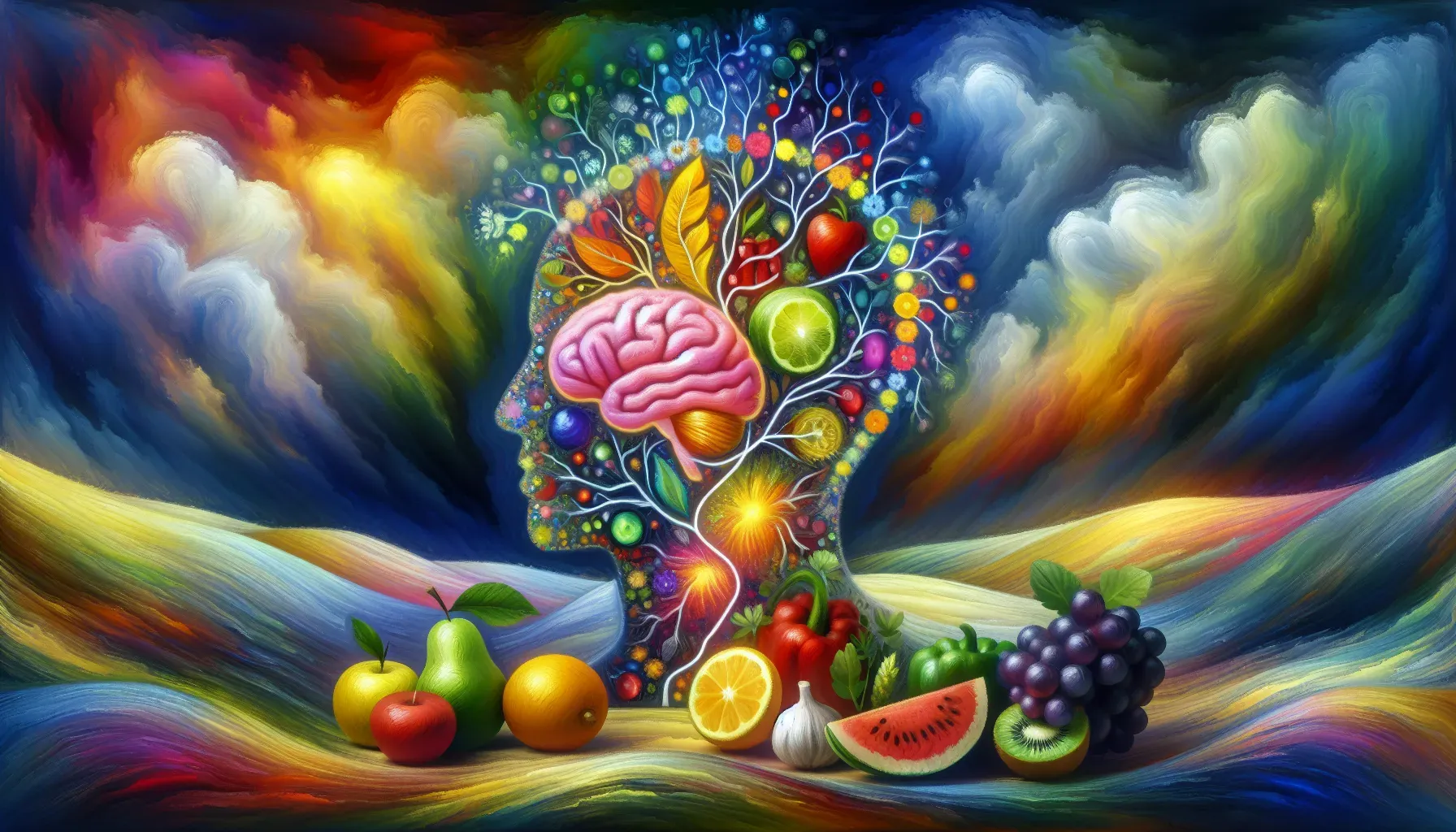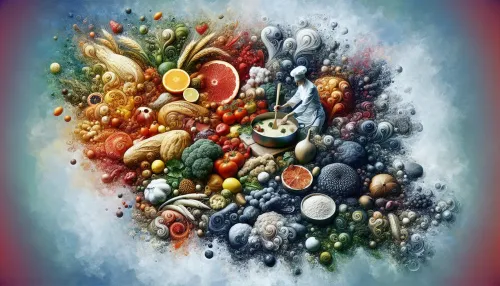Understanding Nutritional Psychology: Decoding the Relationship Between Food and Mood

In recent years, the interplay between nutrition and mental health has garnered significant attention. Research has illuminated a strong correlation between dietary patterns and emotional wellness. It's not uncommon to hear the phrase "you are what you eat," but the extent to which this holds true for mental well-being is truly remarkable.
The Impact of Nutrition on Mental and Emotional Well-Being
The brain, an organ notorious for its energy demands, relies heavily on a consistent supply of nutrients. Consequently, the quality of food consumed can directly influence various aspects of mental health. An imbalance or deficiency in essential nutrients can manifest in a spectrum of psychological symptoms, including mood disorders, anxiety, and cognitive impairments.
The profound impact of diet on psychological health cannot be overstated. Consuming a well-balanced diet rich in essential nutrients is pivotal for supporting optimal brain function. An emphasis on whole foods like fruits, vegetables, lean proteins, and healthy fats provides the body with a diverse array of vitamins, minerals, and antioxidants that play a crucial role in maintaining mental equilibrium.
On the contrary, a diet characterized by excessive consumption of processed foods, refined sugars, and unhealthy fats can contribute to inflammation and oxidative stress within the brain. These physiological disturbances have been linked to an increased susceptibility to mood disorders and diminished cognitive abilities.
Nourishing the Mind: How Diet Affects Psychological Health
The emerging field of nutritional psychiatry delves into the intricate relationship between dietary patterns and mental well-being. Studies within this domain have consistently demonstrated that adherence to a Mediterranean-style diet, characterized by an abundance of fresh produce, whole grains, and omega-3 fatty acids, is associated with a reduced risk of depression and anxiety.
Conversely, diets high in trans fats and sugar-sweetened beverages have been implicated in exacerbating symptoms of depression. Such findings underscore the substantial influence of nutrition on emotional health and emphasize the significance of dietary interventions in psychiatric care.
Related Article: The Ultimate Guide to Holistic Nutrition for Vibrant Health
Nutritional Psychiatry: Exploring the Link Between Food and Mood
The influence of nutrition extends beyond modulating mood to encompass cognitive processes as well. Certain nutrients possess neuroprotective properties that safeguard against age-related cognitive decline and bolster overall mental acuity. For instance, omega-3 fatty acids found abundantly in fatty fish are integral for synaptic function and neurotransmission, potentially mitigating cognitive impairments.
Furthermore, antioxidants present in colorful fruits and vegetables confer neuroprotective benefits by combatting oxidative stress within the brain. Collectively, these nutritional components act synergistically to nurture cognitive resilience and fortify emotional well-being.
Food for Thought: The Role of Nutrition in Cognitive and Emotional Health
The premise of nutritional psychology fervently promotes understanding the gut-brain axis. The intricate network comprising the gut microbiota and the central nervous system has garnered attention for its profound impact on mental health. The ingestion of prebiotic-rich foods such as garlic, onions, and bananas nurtures a conducive environment for beneficial gut bacteria to thrive. This symbiotic relationship yields metabolites that influence neurotransmitter synthesis and neurotransmission in the brain.
Conversely, an imbalance in gut microbiota composition due to poor dietary choices can incite systemic inflammation and compromise neurological function. Thus, prioritizing gut health through prudent dietary decisions is pivotal for preserving emotional equilibrium and cognitive vitality.
Certain foods contain inherent properties that elevate mood and enhance cognitive function. These include:
Gut Feelings: Unveiling the Gut-Brain Connection Through Nutrition
- Dark Chocolate: Rich in flavonoids that promote cerebral blood flow.
- Turmeric: Exhibits anti-inflammatory properties beneficial for neurological health.
- Leafy Greens: Abundant in folate essential for neurotransmitter synthesis.
- Berries: Packed with antioxidants that shield against oxidative stress.
Foods That Heal: Optimizing Mood and Mental Clarity through Nutrition
Augmenting one's diet with these mood-boosting foods fosters a neurologically supportive environment that cultivates emotional well-being.
Comfort foods are emblematic of emotional nourishment during times of distress. While they provide immediate solace, their long-term impact on emotional wellness warrants scrutiny. Consumption of comfort foods high in refined sugars often induces rapid fluctuations in blood glucose levels, precipitating subsequent mood swings and fatigue.
Contrary to conventional belief, the palpable upliftment experienced post-consumption is fleeting and often followed by a rapid decline in mood. A judicious approach toward indulging in comfort foods while prioritizing nutrient-dense alternatives is imperative to preserve sustained emotional wellness.
In conclusion, unraveling the intricacies of nutritional psychology establishes an indelible link between food choices and emotional equipoise. Embracing a dietary regimen teeming with wholesome nutrients not only lays a robust foundation for cognitive vitality but also buttresses emotional resilience.
Frequently Asked Questions
The relationship between nutrition and mental health is significant, as dietary patterns can greatly influence emotional wellness. A balanced diet rich in essential nutrients supports brain function, while deficiencies may lead to mood disorders and cognitive impairments. Thus, what we eat directly impacts our mental well-being.
A well-balanced diet plays a crucial role in psychological health by providing essential nutrients that support brain function. Whole foods such as fruits, vegetables, and lean proteins help maintain mental equilibrium, while processed foods can contribute to inflammation and oxidative stress, negatively impacting mood and cognition.
Nutritional psychiatry is an emerging field that explores the connection between dietary patterns and mental well-being. Research shows that diets like the Mediterranean diet, rich in fresh produce and omega-3 fatty acids, can lower the risk of depression and anxiety, highlighting nutrition's role in emotional health.
Omega-3 fatty acids are vital for cognitive health as they support synaptic function and neurotransmission. Found in fatty fish, these nutrients help protect against age-related cognitive decline and enhance overall mental acuity, contributing to better emotional resilience and cognitive performance.
The gut-brain connection refers to the complex relationship between gut microbiota and the central nervous system. A healthy gut microbiome influences neurotransmitter synthesis, affecting mood and cognition. Consuming prebiotic-rich foods fosters beneficial gut bacteria, promoting emotional stability and cognitive vitality.
Mood-boosting foods include dark chocolate, which enhances blood flow to the brain; turmeric, known for its anti-inflammatory properties; leafy greens rich in folate; and berries packed with antioxidants. Incorporating these foods into your diet can support emotional well-being and cognitive function.
Comfort foods are typically high in refined sugars and fats, providing temporary emotional relief during distress. However, they can lead to blood sugar fluctuations that cause mood swings. A balanced approach to comfort foods is essential for maintaining long-term emotional wellness without compromising nutritional quality.
Prioritizing nutrient-dense foods is crucial for enhancing both physical and mental health. These foods provide essential vitamins and minerals that support brain function, improve mood stability, and reduce the risk of psychological disorders. A nutrient-rich diet lays a strong foundation for overall well-being.



